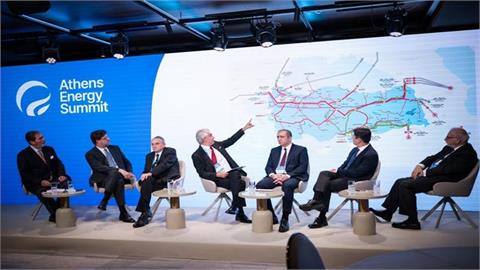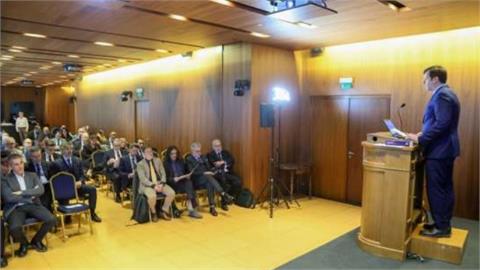Following an invitation by the chairman of the prestigious Athens Academy “Energy Committee” Professor Loukas Christoforou, the Chairman and Executive Director of the IENE Costis Stambolis participated on October 13 in a special colloquium convened by the Academy to discuss energy prices and presented one of the keynote addresses
Following an invitation by the chairman of the prestigious Athens Academy “Energy Committee” Professor Loukas Christoforou, the Chairman and Executive Director of the IENE Costis Stambolis participated on October 13 in a special colloquium convened by the Academy to discuss energy prices and presented one of the keynote addresses. Other speakers included Professor Nicholas Vettas, the head of the Foundation of Economic and Industrial Research (IOBE), Professor Pantelis Capros,former minister and government advisor, Dr.Thomas Thomadakis, Strategy and Development Director at DESFA, Andreas Siamisis, CEO of Helleniq Energy, Professor Christos Zerefos, Prof. Athanasios Dagoumas, chairman of the Energy Regulatory Authority and other distinguished energy experts while the Minister of Environment and Energy, Mr.Theodore Skylakakis contributed opening remarks.
In his address (see here) Costis Stambolis discussed the development of energy prices over the years, mainly in Europe, and drew comparisons between oil, gas and electricity prices. He analysed the way that oil prices behaved over the last 50 years or so and recognised March 1983 as the turning point on how prices are formed following the introduction of oil futures at NYMEX in New York, using the WTI oil variety, and a year later at the Commodities Exchange in London where Brent oil was used as reference commodity. Hence, noted IENE’s chairman, oil prices stopped being determined on a bilateral and largely arbitrary basis, following agreements between the Gulf producers and major western importers, with prices now being set by the futures market and by Platts, which developed a worldwide system to track and report on spot oil prices.
In Europe in the 1990’s major developments took place in the energy sector following EU’s decision to move ahead with bold plans to unbundle the electricity and gas markets. This lead to the creation of a pool type system which allowed the participation of several players, not just the incumbent companies, in wholesale electricity price formation. As the markets evolved and became fully liberalised by early 2000’s the EU introduced the “target model” and encouraged the setting up of energy exchanges throughout Europe. The positive experience of oil price formation through a well organised market was used to set up various energy exchanges through which wholesale electricity and gas prices were now determined using a merit order system for the participation of the different fuel sources. With the most expensive fuel responsible for the determination on a daily basis of the Marginal System Price.
Although a lot of criticism from all different quarters has been levelled against Energy Exchanges,and how their operation has contributed to the phenomenal rise of wholesale electricity and gas prices over the past few months, price formation has responded to legitimate market signals and adequately reflects risk factors, Stambolis underlined in his presentation. Currently an EU backed electricity market reform process is under way in order to allow the RES prices to register somehow into the merit order system or even provide the basis for a parallel RES market. In a final remark the Chairman of IENE pointed out the huge differences prevailing between electricity and gas prices in the USA,China and Europe. The extremely high and artificially inflated CO2 prices, the result of aggressive green policies, are largely to blame for the very high electricity prices in Europe which cannot possibly compete with much lower prices in China which relies more than 60% on coal for its power generation and does not impose any CO2 related taxes, concluded Stambolis.




